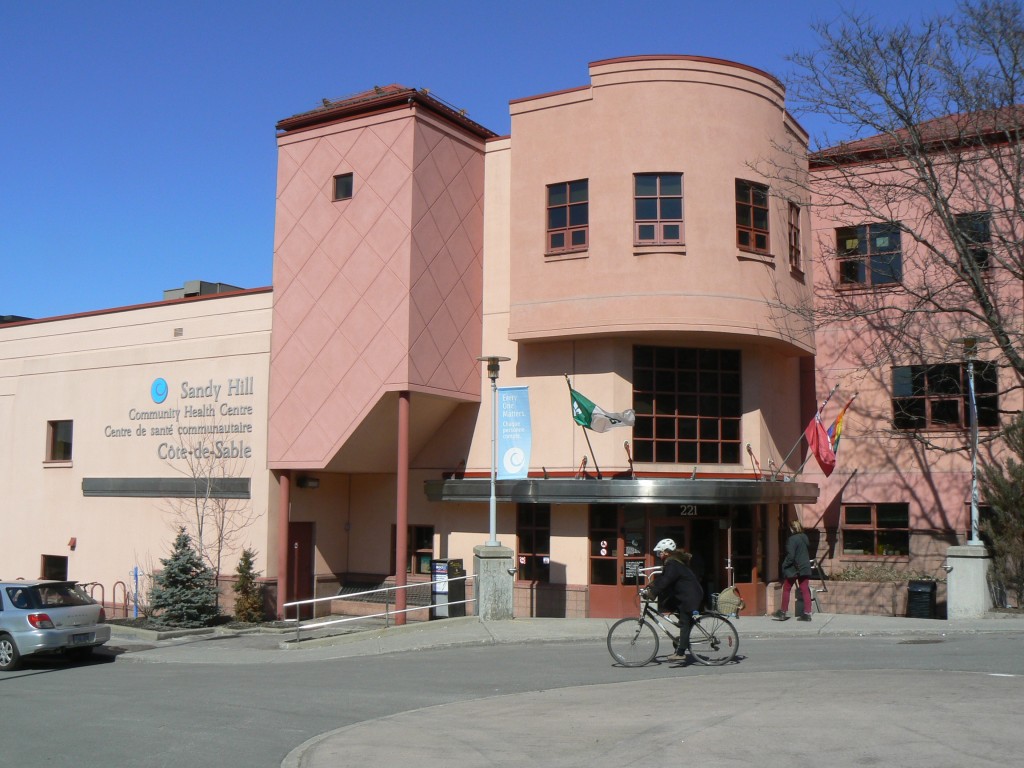Supervised drug injection site considered for Ottawa

The Sandy Hill Community Health Centre could become home to Ottawa’s first supervised injection site. Photo by James Morgan
Is it progressive, preventative, and responsible? Or does it protect and encourage illegal behavior? Those are the questions surrounding the possibility of a supervised drug injection site opening in Ottawa. Such a facility would allow users of illegal drugs like heroin and fentanyl to have access to clean needles under the supervision of public health staff. The idea behind supervised injection sites is to reduce the potential for the spread of diseases like HIV, hepatitis C, and to lower the number of serious or fatal overdoses.
In Ottawa, the cause for supervised injection is spearheaded by an organization called the Campaign for Safer Consumption Sites in Ottawa (CSCS). It says Ottawa has the highest rate of new HIV cases in Ontario resulting from injection drug use. Eleven percent of injection drug users in the city have HIV and 70 percent have hepatitis C. Officials at CSCS use these statistics to justify the campaign. Recently, Dr. Isra Levy, Ottawa’s Medical Officer of Health, who heads the city’s public health department, endorsed the idea of opening a supervised injection site. However, the site would not be operated directly by the public health department. The likely location is the Sandy Hill Community Health Centre on Nelson Street, east of the downtown area. The facility already serves about 700 people through its existing needle exchange program. Becoming a supervised site would allow drug users to not only inject with clean needles, but to also do it under the watch of a nurse who could intervene in the event of an overdose.
The Sandy Hill Community Health Centre is in the midst of a month-long series of public consultations on the supervised injection site plan. Thirty people attended the first meeting and opinions were mixed on the proposal. Final approval of supervised injection sites is given by the Ontario Ministry of Health. According to reports by the CBC and Ottawa Citizen, city council is similarly divided. Mayor Jim Watson is opposed to the plan and wants better addiction treatment services instead. From 2005 to 2007, Watson served as Ontario’s Minister of Health Promotion. Police Chief Charles Bordeleau is also against the idea out of concern it will increase crime and risks to public safety. Even though it would not be the actual operator of a supervised injection facility, the Board of Health is also planning to discuss the idea at its next meeting.
The city public health department in Toronto is also proposing to open three supervised injection sites. The only others in North America are in Vancouver. One opened in 2003 and is called Insite, located in the city’s rough downtown Eastside neighborhood. It was approved by Liberal Prime Minister Jean Chretien’s government. The Conservatives under Stephen Harper were totally opposed to supervised injection sites and tried to defund Insite. The case ended up before the Supreme Court of Canada in 2011 and the court ruled in favor of Insite. The Justin Trudeau Liberal government is supportive of supervised injection. A second site for Vancouver was approved in January of this year. It will be the first supervised injection facility to be integrated into a health care facility—in this case an HIV/AIDS clinic.
There are great advantages and disadvantages to supervised injection sites. Reducing the spread of serious diseases and overdoses are the obvious advantages. The sites reduce the amount of dangerous drug paraphernalia litter being left on the streets, something that poses a serious public health risk and also negatively affects the image of the surrounding neighborhood. Supervised injection at a facility operated by medical professionals also allows drug addicts who want to end their addiction to more easily withdraw from drug use by being able to consult with health professionals at the site and through other addiction services it offers.
As for disadvantages, supervised injection sites are taxpayer-funded places for people to use dangerous substances that are illegal for individuals to possess. Users can go to the facility to inject themselves with drugs, but face no risk of arrest for possessing the illegal substance. Another possible disadvantage is that a supervised injection facility will bring more drug addicts and crime into neighborhoods already facing social problems.
The biggest challenge of all for Ottawa residents is probably having to face the fact that there is an illegal drug addiction problem in the city. One way or another, it needs to be addressed in order to save lives and protect public health and safety. The overall uncomfortable truth is that whether it’s through supervised injection sites or other means, something needs to be done.
Tags: canada, drug addiction, health, ottawa, supervised injection








Why is it I never hear about people being arrested for using heroin but frequently hear people being arrested for using marijuana?
I guess in the eyes of the law, marijuana is a horrible drug while heroin is just something white kids get hooked on when they could no longer rob their parents of their stash of pain killers.